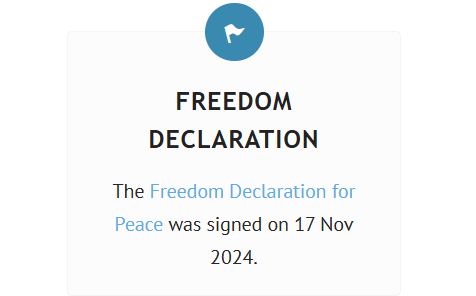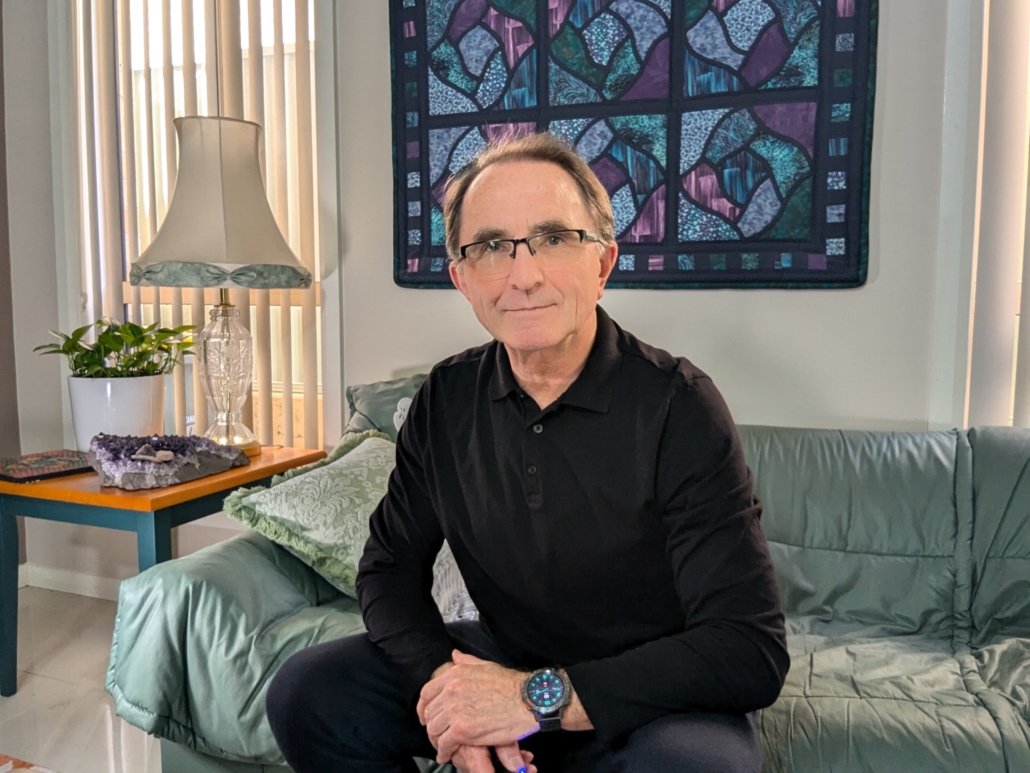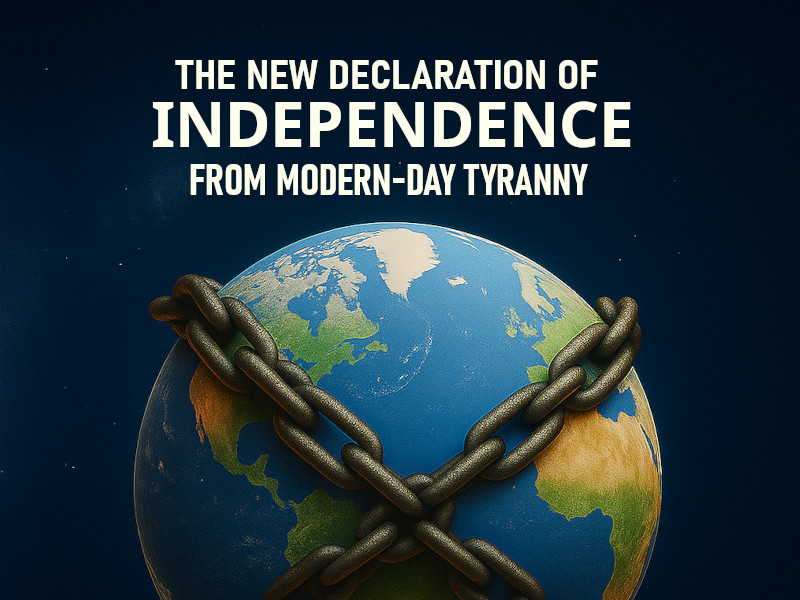The Great Signing for Peace & Freedom from Modern-day Tyranny
A global declaration of independence from corruption, authoritarianism, moral decay, social chaos, environmental collapse, and the looming threat of WW III
→ Listen to this article or skip to the AI overview.
The world today faces alarming parallels with the 1930s. The once-unthinkable prospect of World War III now looms — compounded by social decay, rising violence, and the accelerating breakdown of Earth’s climate systems.
These crises are not isolated; they are symptoms of a collapsing Industrial Age order that can no longer safeguard peace, stability, or the planet itself. What’s needed is not incremental reform but a complete reset.
World War II forced such a reset — but only after tens of millions of lives were lost. This time, with nuclear weapons on the table, the stakes are existential. Unless humanity chooses another path, another violent reset could wipe out civilization itself.
Two competing visions now define our century. Project Russia, emerging from Moscow’s security elite, proposes a “spiritual autocracy” to replace liberal democracy—an ideological blueprint for control and obedience disguised as moral renewal. In contrast, The Great Signing offers a peaceful alternative: a framework for transformation across society’s three pillars—social, political, and economic—rooted not in domination but in trust, transparency, and human dignity. It builds on the insights of modern thinkers like Alvin Toffler, Karl Polanyi, and Rosa Luxemburg, while heeding their warnings about complacency and inaction.
As the 250th anniversary of the American Declaration of Independence approaches, we are called to expand that dream of liberty, peace, and prosperity — not for one nation alone, but for all humanity — through a new declaration of independence.
Why do we need a new declaration?
The American Revolution teaches us that declarations matter. A nation was not born from battle alone, but from a vision — a written statement of purpose that united people around shared ideals of freedom and self-government.
Project Russia, by contrast, shows how declarations can also be twisted — how the power-hungry cloak their ambitions in the language of faith, order, and renewal to subvert society and advance authoritarian control.
To defend freedom against both chaos and tyranny, the world once again needs a unifying declaration — one that restores moral clarity, anchors accountability, and renews our shared purpose in the pursuit of peace.
Insights and Warnings from Toffler, Polanyi, and Luxemburg
Our existing institutions — built for the Industrial Age — are no longer fit for purpose. The early warnings were clear:
-
Alvin Toffler, in The Third Wave, foresaw the collapse of the Industrial Age and the rise of a post-industrial civilization shaped by information and networks. He warned that “blind men” clinging to outdated systems would resist change.¹ Toffler also recognized the promise and peril of the information age: global connectivity could empower cooperation on an unprecedented scale, but it could also unleash fragmentation and disorientation if not anchored in moral purpose.
-
Karl Polanyi, in The Great Transformation, explained how markets, once embedded in society, had become disembedded — devouring land, labor, and money as commodities, and corroding democracy itself.² He described a “double movement” in which societies inevitably push back against unregulated markets. Today’s demands for climate justice, human rights, and democratic renewal are precisely such a pushback — but without strong enough institutions, they fall short.
-
Rosa Luxemburg, in The Accumulation of Capital, warned that capitalism must constantly find new outlets for surplus production — and that without them, it would collapse.³ Historically, imperialism and colonialism served as escape valves. But those frontiers are now exhausted. The planet is finite, the climate destabilized, and digital frontiers cannot replace ecological limits. Only social reinvestment — turning surplus into shared prosperity — can prevent systemic breakdown.
Today, their insights converge. Our crises are not accidental but the predictable outcome of institutions designed for another age. What they foresaw, technology now makes it possible to overcome — if we act.
A New Declaration for a Complete Reset
The Great Signing provides a framework for transformation across society’s three key pillars:
1. Social — The Freedom Declaration for Peace
In 1776, fifty-six men signed a declaration that birthed a nation. Today, technology allows millions to sign a new declaration — forging a global social contract that reclaims the moral center abandoned by neoliberalism and postmodern relativism.
The Freedom Declaration for Peace affirms that freedom, peace, human rights, moral living, ecological balance, and shared prosperity are not lofty ideals but essential foundations for humanity’s survival. As a shared vision, it enables people everywhere to deliberate and decide major issues in good faith through Open Democracy.
2. Political — Implementing Open Democracy
Open Democracy extends self-government beyond occasional elections. It allows citizens to participate continuously, issue by issue, through verifiable and transparent systems — locally, nationally, and globally.
Anchored in shared principles from the Declaration, it reaffirms a basic tenet of democracy: elected officials exist to enact the will of the people, not to rule over them like kings or dictators.
3. Economic — Establishing the Global Social Capital Fund (GSCF)
In a globalized economy, power flows through capital — too often concentrated in the hands of the few to dominate the many. The GSCF redirects that power toward the common good.
Funded by a 1–3% levy through PByT Business Memberships, it could grow to trillions, distributed annually through the nonprofit sector. It will not only provide humanitarian aid but also form the basis of a new kind of economy — one fit for the information age of automation and AI.
As automation reshapes labor and AI transforms productivity, the industrial economy can no longer provide stability or dignity for billions. The GSCF offers a solution: a global pool of resources dedicated to strengthening societies, supporting citizens, and rewarding nations that uphold universal standards. Participation will be limited to countries that are open democracies, members of the International Criminal Court, and signatories to the Paris Climate Agreement.
Trillions of Reasons for Change
As the Global Social Capital Fund grows, it will provide governments with powerful incentives to:
- Transition to Open Democracy, curtailing lobby group influence.
- Expand the reach of the ICC, ending impunity for war crimes.
- Drive urgent climate action tied to measurable progress.
For democracies, this will break the grip of party machines. For authoritarian regimes, it will increase pressure to comply—or risk citizen revolt.
Ending Wars Through Accountability
The proposed expansion of the ICC globally sends an unmistakable message to leaders, enablers and their networks that they are not immune and justice is coming.
This also sends an unmistakable message to those who support war crimes—directly or indirectly, including through the supply of weapons—that they, too, may face accountability.
Driving Climate Action
According to the Climate Action Tracker, action on climate change has stalled or even regressed, primarily because of the lack of political will to implement the necessary measures.4
The linking of the GSCF to meaningful action on climate change - as measured by the Climate Action Tracker - will give new urgency to addressing the looming humanitarian and environmental crisis.
Re-embedding the Market in Society
Karl Polanyi warned that “acceptance of market principles at the core of modern society invites disaster.” That warning is no longer theoretical—it has become our lived reality.
The market must once again be re-embedded within society, serving humanity rather than enslaving it. This shift can begin in two critical ways:
- By advancing a shared vision that restores human values—not market principles—to the core of society.
- By creating an economic model that expands the common good beyond profit, to include social capital through a Global Social Capital Fund.
Towards Sustainable Capitalism
The Great Signing transforms Rosa Luxemburg’s warning that capitalism would collapse without new outlets to an opportunity. The new outlet is not geographical expansion but social expansion: channeling surplus into education, healthcare, climate stabilization, and democratic renewal.
This will force capitalism to evolve by redirecting its excess toward sustaining societies and ecosystems rather than fueling endless accumulation.
A Call to Action
For the first time in history, we can reset society peacefully—not through subjugation, revolution, or war, but through one simple action multiplied millions of times by:
→ Signing the Freedom Declaration for Peace.
This is not a petition. It is a people-led declaration—an act of global unity that can sweep away the collapsing Industrial Age and usher in a new civilization, more just and humane than ever before.
Why This Matters
From Gaza to Ukraine, from refugee camps to climate disaster zones, people everywhere are losing their basic rights to peace, safety, and dignity.
Authoritarians thrive by dividing us. The Great Signing unites us across borders, faiths, and ideologies.
At the same time, ideologies such as Project Russia—which present authoritarian control as moral renewal—seek to capture the world’s disillusionment with liberal democracy. They promise order but deliver subservience. They replace the failures of neoliberalism not with justice, but with hierarchy, fear, and militarized faith.
The Great Signing is humanity’s answer: a peaceful, democratic, and moral reset that reclaims freedom and truth from both market tyranny and autocratic deceit.
No leader should ever have the power to deny their citizens peace, justice, or survival.
Make a stand for global renewal by signing the Freedom Declaration for Peace today. Together, we can avert the looming threat of WWIII, drive real action to protect the environment and build a world anchored in freedom, justice, and peace.
References
- Toffler, Alvin. The Third Wave. New York: William Morrow, 1980.
- Polanyi, Karl. The Great Transformation: The Political and Economic Origins of Our Time. New York: Rinehart, 1944.
- Luxemburg, Rosa. The Accumulation of Capital. London: Routledge & Kegan Paul, 1951 [1913].
- Climate Action Tracker. “Warming Projections Global Update.” https://climateactiontracker.org
***
An AI overview
To show what’s possible, we asked AI to explore the idea of The Great Signing—testing its ability to unite people around a common cause. The first outputs, in English and Russian, are only the beginning. More languages are coming soon.
Now we invite you to help us amplify the message, engage the world, and reach at least 1 million signatures by July 4, 2026.
→ Sign the Freedom Declaration for Peace today to claim your moment in history—forever recorded in your PByT profile for future generations.

***
About PByT
PByT (Powered by Trust) is building the digital foundation for a more trustworthy world. By combining verified feedback, transparent reputation management, and open democratic participation, it empowers individuals, strengthens communities, and restores accountability to public life. PByT transforms technology into a force for truth and cooperation — proving that when people are empowered to give honest feedback and act on shared values, trust becomes the engine of real systemic change.
About George Matafonov

George Matafonov, Founder of PByT.net
George Matafonov is the founder and CEO of PByT.net, the platform launching Project Open Democracy—a bold, global initiative with a singular aim: to realize the hope of humanity and the promise of technology—peace and prosperity for all.
Of Russian heritage, George was born in China during the diaspora that followed the Russian Revolution and communist takeover. His family fled once more as communism swept through China, eventually settling in Australia.
With a background in mathematics (BSc) and decades of experience in software development and IT, George brings both analytical clarity and technical depth to the urgent challenge of democratic reinvention. As the architect of PByT, he has built more than a platform—he has outlined a new model of civic participation designed for a rapidly evolving, interconnected world.
Project Open Democracy is the culmination of his long-standing concern over the breakdown of trust, truth, and social cohesion—what he identifies as the consequence of an unholy alliance between neoliberalism and postmodernism. This diagnosis shapes the entire PByT initiative and provides the philosophical foundation for its centerpiece: the Freedom Declaration for Peace.
***
Reprint Permission
This work is licensed under a Creative Commons Attribution-NoDerivatives 4.0 International License. It may be shared and republished in full, without changes, with credit to Project Open Democracy and a link to https://pbyt.net/great-signing
Editor’s Note
Nearly 250 years after America’s Declaration of Independence, humanity faces a new tyranny—an alliance of unfettered markets, broken economic systems, and resurgent authoritarianism. Traditional tools of change—protests, boycotts, even elections—are failing to deliver meaningful results.
The Great Signing is a global campaign to unite at least one million people in signing the Freedom Declaration for Peace by July 4, 2026. It calls for a peaceful reset of society through three pillars: forging a new social contract, implementing open democracy, and establishing a Global Social Capital Fund.
This is not a petition. It is a people-led declaration—an act of global unity that can reset society without war, revolution, or subjugation.
Learn more: https://pbyt.net/great-signing



